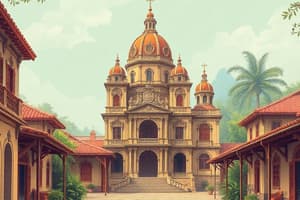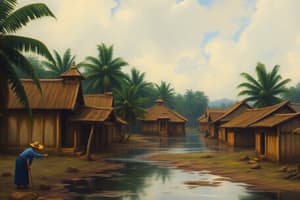Podcast
Questions and Answers
What was the basic political unit that existed in the Philippines historically?
What was the basic political unit that existed in the Philippines historically?
- Balangay
- Barangay (correct)
- Sultanate
- Datu
Who served as the commander-in-chief during times of war in a barangay?
Who served as the commander-in-chief during times of war in a barangay?
- Qadi
- Rajah
- Datu (correct)
- Maharlica
Which class was referred to as 'Timawas' in the social structure of the barangay?
Which class was referred to as 'Timawas' in the social structure of the barangay?
- Noble class
- Serfs
- Warriors
- Freemen (correct)
What established the political legitimacy in the sultanates of Mindanao?
What established the political legitimacy in the sultanates of Mindanao?
Which figure is recognized as the first Sultan of the Sultanate of Sulu?
Which figure is recognized as the first Sultan of the Sultanate of Sulu?
What was the capital of the Sultanate of Sulu?
What was the capital of the Sultanate of Sulu?
What does 'Shariah Law' refer to in the context of the Sultanate of Sulu?
What does 'Shariah Law' refer to in the context of the Sultanate of Sulu?
Which role was directly responsible for the maritime forces in the historical political structure?
Which role was directly responsible for the maritime forces in the historical political structure?
What event largely interrupted the Proto-Sultanate of Maynilad?
What event largely interrupted the Proto-Sultanate of Maynilad?
What does colonialism primarily involve?
What does colonialism primarily involve?
Which year did Ferdinand Magellan and his troops land in the Philippine Islands?
Which year did Ferdinand Magellan and his troops land in the Philippine Islands?
What was one of the reactions of the locals when Magellan's crew arrived?
What was one of the reactions of the locals when Magellan's crew arrived?
What does the narrative account of the first circumnavigation document?
What does the narrative account of the first circumnavigation document?
During the initial encounter, how did Magellan's crew strategize their landing?
During the initial encounter, how did Magellan's crew strategize their landing?
What significant historical period does the content refer to regarding cultural and intellectual progress in Europe?
What significant historical period does the content refer to regarding cultural and intellectual progress in Europe?
What type of alliances contributed to the emergence of the Proto-Sultanate?
What type of alliances contributed to the emergence of the Proto-Sultanate?
What did the captain-general provide to the indigenous leaders as a sign of courtesy?
What did the captain-general provide to the indigenous leaders as a sign of courtesy?
Which two indigenous leaders participated in the mass mentioned in the content?
Which two indigenous leaders participated in the mass mentioned in the content?
What was the primary purpose of the formal system of forced labor in the Spanish colonies?
What was the primary purpose of the formal system of forced labor in the Spanish colonies?
How did the indigenous leaders express their willingness to provide food?
How did the indigenous leaders express their willingness to provide food?
What types of food did the indigenous men present to the captain-general?
What types of food did the indigenous men present to the captain-general?
What was signified by the ringing of church bells in the indigenous communities?
What was signified by the ringing of church bells in the indigenous communities?
What items did the indigenous men promise to bring within four days?
What items did the indigenous men promise to bring within four days?
What was the role of indigenous leaders under the colonial system?
What was the role of indigenous leaders under the colonial system?
What was the moral goal outlined for the Filipinos?
What was the moral goal outlined for the Filipinos?
Which of the following statements reflects the message about equality regardless of skin color?
Which of the following statements reflects the message about equality regardless of skin color?
What does the teaching regarding time emphasize?
What does the teaching regarding time emphasize?
What is described as a true expression of holiness?
What is described as a true expression of holiness?
What lesson is conveyed about defending the oppressed?
What lesson is conveyed about defending the oppressed?
What was one of the main powers of the Viceroy of Nueva España?
What was one of the main powers of the Viceroy of Nueva España?
Which body was responsible for conducting judicial reviews of an official's acts at the conclusion of their term?
Which body was responsible for conducting judicial reviews of an official's acts at the conclusion of their term?
What was a role of the Visitador in the Spanish colonies?
What was a role of the Visitador in the Spanish colonies?
Which religious group had the highest recorded number of members in the Philippines in 1892?
Which religious group had the highest recorded number of members in the Philippines in 1892?
What authority did the Vice Real Patron hold?
What authority did the Vice Real Patron hold?
What could the Viceroy do under the Cumplase directive?
What could the Viceroy do under the Cumplase directive?
In 1895, how many Jesuits were recorded in the Philippines?
In 1895, how many Jesuits were recorded in the Philippines?
What responsibility did local religious authorities have in the colony?
What responsibility did local religious authorities have in the colony?
Study Notes
Pre-Colonial Philippines
- The basic political unit was the barangay, an independent polity with a defined territory.
- The barangay was led by a Datu or Chieftain, who held authority over the territory, served as commander-in-chief during wars, and was responsible for the people's livelihood.
- The Datu's position was inherited by birth or earned through valor.
- The Visayan society had a social class system: Maharlika (nobility), Timawas (freemen), and Alipin (slaves).
- The Alipin were further divided into Namamahay (slaves who had their own homes and families) and Sagigilid (slaves who were bound to their masters' homes).
- In Luzon and Visayas, powerful leaders were known as Lakans and Rajahs.
- The Kingdoms of Manila and Tondo were connected through alliances.
Sultanates in Mindanao
- In the 1400s, Sulu and Maguindanao in Mindanao organized themselves into sultanates based on blood and religious ties.
- The sultanate system was centralized, with the Sultan at the top, followed by Datu and Rajah.
- The Ruma Bichara (council) advised the Sultan and included Datus who represented their barangays, Panglima (aristocrats), Wajir (advisers), Rajah laut (leader of the maritime forces), and the Qadi (magistrate).
- Shariah Law was the primary legal and moral code, dividing actions into five categories: obligatory, recommended, permitted, discouraged, and forbidden.
- In 1500, Sultanate of Sulu was established by Sayyid Abu Bakr, a Muslim missionary. His first code of law, known as the "Shariah Law," governed Sulu, surrounding areas in Mindanao, Borneo, and Palawan.
- The Sultanate of Maguindanao was established in the 1500s by Sharif Muhammed Kabungsuwan. It expanded through military alliances, intermarriages, and religious conversions.
Colonization and the Age of Discovery
- The Age of Discovery was a period of intellectual and cultural rebirth in Europe during the 14th century.
- It sparked the European desire for exploration, leading to the Age of Discovery.
- Colonization, an economic and political ideology, emphasized the acquisition of power and influence based on conquering territories and establishing colonies.
- The 1521 arrival of Ferdinand Magellan's expedition marked the beginning of Spanish colonization in the Philippines.
Spanish Colonization
- Magellan's expedition landed in the Philippine islands in 1521 and explored the Eastern and Central Visayas.
- The expedition encountered resistance from indigenous people, described by chronicler Antonio Pigafetta.
- The expedition's account provided a narrative of the first circum navigation and documented the events during the voyage.
- The expedition landed in Limasawa in March 1521, where Rajah Colambu and Rajah Siagu participated in the first mass celebrated in the Philippines.
- Legazpi’s expedition successfully conquered the Philippines and established a colony in 1565.
Spanish Colonial Society
- The Spanish colonial society was characterized by the forced relocation of indigenous people into poblaciones, which were within hearing distance of church bells.
- The daily life was dictated by the ringing of bells, signifying times for congregation and special occasions.
- The encomienda system established a formal system of forced labor in Spanish colonies, aiming to encourage conquest and colonization.
- Encomenderos (Spanish officials) were tasked with establishing political authority, improving local economy, promoting education, and evangelizing the native population.
- Encomienda also compelled indigenous leaders to pay tribute to colonists in various forms.
- The encomienda system was characterized by forced labor, brutality, loss of freedom, and denial of rights.
Spanish Administrative System
- The Spanish colonial administration was hierarchical and centralized, with the monarch of Spain at the top.
- The Viceroy of New Spain (Mexico) and the Consejo de Indias (Council of Indies) held significant power.
- The Ministerio de Ultramar (Overseas Ministry) played an administrative role, implemented laws, and acted as the Commander-in-Chief.
- The Governor General represented the Spanish monarchy and held both executive and judicial power.
- The Governor General had authority over the appointment of government officials and priests.
- The Governor General could ignore or suspend laws imposed by the crown.
- The Governor General was appointed by the Viceroy for a short and defined term.
Abuse of Power
- The Governor General and other officials often abused their power.
- To investigate these abuses, specific bodies were created:
- Residencia conducted a judicial review of an official's actions at the conclusion of his term.
- Visita was a special investigation conducted in response to perceived mismanagement or emergencies.
- Royal Audencia was an advisory body that had the power to check and report on abuses, audit expenditures, and send annual reports to Spain.
The Role of the Church
- The Spanish church played a crucial role in the colonies, playing a significant part in administration.
- Religious orders like the Augustinians, Franciscans, and Jesuits, dominated religious activities and held influence in administrative matters.
- The religious orders supervised the elections of local officials and kept track of the town's population.
Filipino Resistance
-
The first major attempt to separate the Philippines from Spain was made by Graciano Lopez Jaena in 1874.
-
The Katipunan, a revolutionary society, emerged in the late 19th century, led by Andres Bonifacio.
-
The Katipunan's "Mga Aral nang Katipunan ng mga A.N.B." outlined their values and principles.
-
Key values of the Katipunan were:
- Equality: All people are equal, regardless of their skin color or social status.
- Honor and Integrity: Prioritizing dignity over self-interest.
- Self-reliance: Filipinos should take initiative and help themselves.
- Justice: Protecting the oppressed and fighting against oppression.
- Wisdom: Carefully choosing words and keeping secrets.
- Time Management: Using time wisely and recognizing its value.
- Respect for Women: Men should lead their families with wisdom and responsibility.
Studying That Suits You
Use AI to generate personalized quizzes and flashcards to suit your learning preferences.
Related Documents
Description
Test your knowledge about the Pre-Colonial Philippines, focusing on the political structure, social classes, and the sultanate systems in Mindanao. Explore the roles of the Datu, the barangay system, and the impact of alliances among kingdoms. Dive into the rich history of the region through this engaging quiz.




